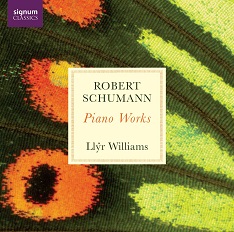Llyr Williams ist einer der Pianisten, die ohne Allüren und mit großer Besonnenheit spielen. Klare Phrasierungen, perfekt dosierte Eleganz, männliche Klänge: Williams spricht immer durch den Komponisten mit dem Zuhörer. Es geht ihm nicht ums Energetische, nicht um Show, sondern um den Text, und den will er so gut wie möglich zur Gehör bringen.
Der walisische Pianist hat eine große Affinität für Schumann, und er interpretiert diese fünf Stücke mit einer bemerkenswerten Reife und Poesie. Gleich in der Fantasie op. 17 zieht sein warmer Ton an, und er entfaltet die Melodien mit einer Geschmeidigkeit, die selbst die Stille lebendig werden lässt. Die Komposition ist von Zurückhaltung geprägt, die in einer Lesart, die die musikalische Linie überall, sogar im Pianissimo, bevorzugt, wunderbar wiedergegeben wird. So wird der Gesang im dritten Satz der Fantasie wahrhaft apollinisch.
Die Papillons entfalten bei Williams ihren genuinen Charme mit einer inneren Lebendigkeit, die jeden Anflug von Banalität verhindert. In Williams’ Schumann sucht man weder nach klanglicher Kraft noch nach schroffen Akzenten. Und so wird die Humoreske bei ihm mit einer gesunden Mischung aus leichtem und eleganten Spiel und romantischem Flair dargeboten
Sicher beherrscht er auch den Zyklus der Davidsbündlertänze Er stellt die Welten des Florestan und Eusebius raffiniert gegenüber, versteht es prächtig, von der einen zur anderen zu wechseln, wobei ihm sein klarer Anschlag, sein Sinn für Klangfarben und seine Kunst, sie dem Instrument zu entlocken, zugutekommen.
Die ruhigen Nachtstücke gehen dem Faschingsschwank aus Wien voraus. Hier gibt sich Williams etwas zupackender, vermeidet aber zu viel Sonorität und puren Glanz, um sich auch auf Differenzierung und Stimmungswechsel zu konzentrieren.
Das sind also reife Interpretationen, ehrlich formuliert und bei aller Zurückhaltung immer wach und attraktiv.
Llyr Williams is one of those pianists who play without airs and graces and with great thoughtfulness. Clear phrasing, perfectly measured elegance, masculine sounds: Williams always speaks to the listener through the composer. He is not concerned with energy, not with show, but with the text, and he wants to make it heard as well as possible.
The Welsh pianist has a great affinity for Schumann, and he interprets these five pieces with remarkable maturity and poetry. His warm tone picks up immediately in the Fantasy op. 17, and he unfolds the melodies with a suppleness that brings even the silence to life. The composition is characterized by restraint, which is beautifully rendered in a reading that favors the musical line everywhere, even in pianissimo. Thus the singing in the third movement of the fantasy becomes truly Apollonian.
The Papillons unfold their genuine charm with an inner liveliness that prevents any hint of banality. In Williams’ Schumann, one seeks neither tonal power nor brusque accents. And so he performs the Humoresque with a healthy mixture of light and elegant playing and romantic flair
He also masters the cycle of the Davidsbündlertänze with confidence. He contrasts the worlds of Florestan and Eusebius in a sophisticated manner, and knows how to switch from one to the other magnificently, benefiting from his clear touch, his sense of timbre and his ability to elicit it from the instrument.
The quiet night pieces precede the carnival swing from Vienna. Here Williams is a little more gripping, but avoids too much sonority and pure brilliance in order to concentrate on differentiation and mood changes.
These are mature interpretations, honestly formulated and, despite all restraint, always alert and attractive.


















